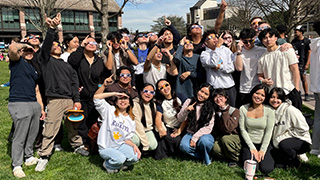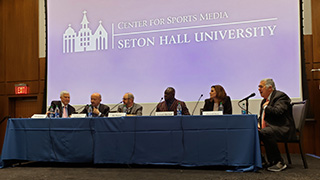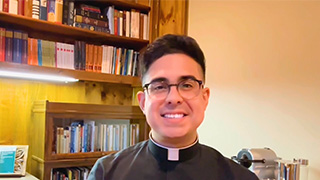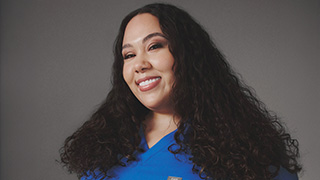Professors Balkun and Deyrup Publish Transformative Digital Humanities, Receive Grant
Friday, August 28, 2020
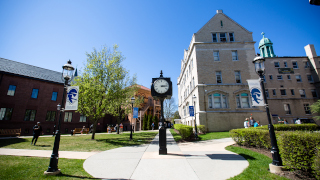
Following a smaller "Incubation Grant" to get the project moving, the digital humanities team and English department at Seton Hall also received an Action Grant for nearly $20,000 from the New Jersey Council for the Humanities in support of the continuation of its work.
Entitled, "The Digital Citizenry Project," the initiative fosters conversations across four towns –East Orange, Orange, South Orange, and Maplewood – about what it means to be an engaged citizen in the 21st century, and seeks to "improve the understanding and use of digital information, especially in light of the impact of these on the 2016 presidential election."
Balkun and Deyrup have been at the heart of Digital Humanities work at Seton Hall.
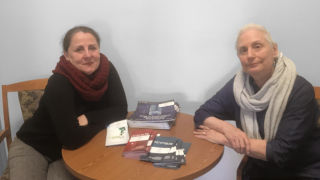
In 2015 they organized a series of lectures and hands-on workshops on the digital humanities for faculty on the South Orange campus. Over the next three years, approximately 30 faculty members went through the program and several went on to receive outside funding for their work. The most significant grant was received by William Connell, Professor of History, who was named a 2019 Andrew Carnegie Fellow and awarded $200,000 for his DH project, "Tracking Migrant Labor in Renaissance Florence."
Also notable among DH Fellows at Seton Hall is the work of Nalin Johri, assistant professor in the Department of Interprofessional Health Sciences and Health Administration, who authored Health Services Research and Analytics Using Excel, through Springer Publishing; and Dongdong Chen, associate professor of Asian Studies and director of Graduate Studies in the Department of Languages Literatures and Cultures, who published "Developing Chinese Matching Games: from Inception to Completion" in the Journal of Technology and Chinese Language Teaching.
In this same three-year period, Balkun and Deyrup, building on a similar interest shown by other state educational institutions, founded the New Jersey Digital Humanities Consortium (NJDHC), a group of faculty, librarians and instructional designers who meet to share information about digitization efforts at their state institutions. The consortium includes Rutgers University New Brunswick, Rutgers University Newark, Ramapo College, Princeton University, Montclair State University, Drew University, as well as the Institute for Advanced Studies in Princeton.
In Transformative Digital Humanities, Balkun and Deyrup, Eds., also contributed a chapter in the book on these developments at Seton Hall and throughout New Jersey, essentially using their experience to publish a "how-to" guide for others seeking to build or further develop Digital Humanities programs at their institutions.
They write,
We were motivated, in part, by the words of Mark Sample in his essay "On the Death of the Digital Humanities Center":
So if you're interested in the transformative power of technology upon your teaching and research, don't sit around waiting for a digital humanities center to pop up on your campus or make you a primary investigator on a grant. Act as if there's no such thing as a digital humanities center. Instead, create your own network of possible collaborators. Don't hope for or rely upon institutional support or recognition. To survive and thrive, digital humanists must be agile, mobile, insurgent. Decentralized and nonhierarchical. Stop forming committees and begin creating coalitions. Seek affinities over affiliations, networks over institutes.
Balkun and Deyrup did just that, not only forming the NJDHC but also applying for grants in partnership with Ramapo College of New Jersey. The schools were awarded joint grants from the Bringing Theory to Practice Project – which is funded by The Endeavor Foundation and The Andrew W. Mellon Foundation – and the Booth Ferris Foundation. The projects focused on incorporating digital humanities tools, and skills into undergraduate courses and involved almost 30 faculty members from the two schools.
Regarding the book itself, which seeks to look at Digital Humanities from the various perspectives of scholars and practitioners within the burgeoning field, Balkun and Deyrup write:
The common theme of the thirteen chapters that comprise Transformative Digital Humanities: Challenges and Opportunities is the transformative potential of the digital humanities as a field. We use the word "potential" here intentionally, because the chapters in this volume are of two kinds. Some present projects that are changing the access to information or data, describe improved or enhanced processes, or detail changing fields of study. Others outline challenges to that potentiality, both currently and moving forward, such as the need for broad accessibility; for accepted scholarly standards in the creation, description, and evaluation of projects; and for collaboration and coalition building within the DH community.
Regarding the book's title, Balkun and Deyrup note what they call the "revolutionary potential" of Digital Humanities:
We originally decided on the prospective title for this volume, Transformative Digital Humanities, for a very prosaic reason: like so many others, we were intrigued by the revolutionary potential of DH for so many fields. We have seen the ways it can enable instructors to better engage and collaborate with students and one another; it can make archival materials more readily and widely available for research; it can improve information sharing and make activities such as textual analysis easier; it can make data more widely usable; it can help to make work that was often relegated to classrooms and academic journals or books public.
The book, Transformative Digital Humanities: Challenges and Opportunities, is available through Amazon and through the University Libraries.
Categories: Arts and Culture

